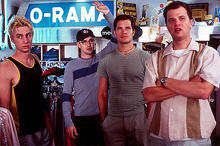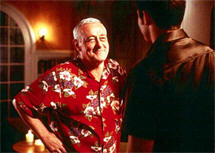 |


|
|
A Romantic Comedy
|
|
By John Demetry
The filmmakers, primarily writer-director Greg Berlaniti, seem to assure the audience: you deserve this, not the cheap, moral and aesthetic ugliness of that DV-to-film sham Chuck & Buck. This respect extends to audience and characters alike. Frankly, I haven't laughed and cried this much at the movies in ages, but this reaction should not be confused with being crassly manipulated. Every laugh, every tear is achieved through gentle characterization and visual storytelling; that is, through imagination. Not up to the aesthetically transcendent standard of Queer As Folk or Robert Altman's Dr. T & the Women, The Broken Heart's Club, then, is to gay men what Eric Mendelsohn's earlier 2000 release Judy Berlin was to women.
Perhaps that's the strength of first-time filmmaker Berlanti doing double duty: writing and directing (as it was for Mendelsohn with Judy Berlin). He doesn't have to spell everything out at the level of screenplay. Berlanti lets the richness pour through simultaneously extroverted and thin-skinned performances. That's great pop art. (Writer-director Woody Allen has rarely displayed this since Annie Hall.) Dennis works at a restaurant called Jack's Broken Hearts Club, relegating his true passions, photography and touring Europe, to the backburner while cooking up one-night stands and funny, but shallow, gay quips with his friends. (Dennis' amateur photographs become an understated visual metaphor for both the characters' individual crises and group salvation.) Like Dennis, each dabbles with breaking from the group. At first, it's easy to see why. However, the most amazing thing Berlanti accomplishes allows us to recognize ourselves in the tentative bonds of these friends, then reveals the deeper bonds that sustain them. They discover that these bonds are exactly what can help them fulfill their lives-not the thing holding them back. Here's an example of how Berlanti expresses this with such aplomb. It occurs when Howie (Matt McGrath) sits back to watch how his friends both cheer up and make amends with Benji (Zach Braff), who has strayed from the "Broken Hearts" into a group of muscle-boiz and ended up in the hospital after a drug overdose. The friends console him with a recurring subject of conversation: taking "straight" ensemble pieces like Steel Magnolias, and, in this scene, St. Elmo's Fire and identifying which character best describes them. In an earlier scene, Howie complained that there are no gay films like these. Berlanti consciously makes us aware that this reverence for these, let's face it, bad films is an act of projection. In the hospital scene, Berlanti's widescreen camera moves from the group to Howie off to the side. McGrath's barely detectable shifts in body language and facial expression signal a moment of personal awareness that the shallow conversation is an extension of the depth of their friendship. This realization leads to one of the life-changing decisions that effect each of the friends and strengthens their friendship.
As chapter headings, Berlanti introduces the audience to gay dictionary definitions of slang terms like "meanwhile." or "newbie." A "newbie" is someone who's just coming out, fresh meat destined for heartbreak. The film features a newbie, Kevin, played by soulful heart throb Andrew Keegan. In the course of the film, he moves from awkward adolescence to self-acceptance. Isn't that the process for everyone's sexual awakening, if they're lucky, if they have friends and family to support them? The Broken Hearts Club isn't stupid about that, like that paradigm of bad queer cinema, Billy's Hollywood Screen Kiss. Its final definition: "Five months later; a phrase used by both gays and straights to denote the passage of five months". That expands everything in the film. These are the rites of passages everyone shares. The Broken Hearts Club breaks your heart, then dramatizes the struggles to mend it. It's got just what is needed at the multiplexes: a big, beating pop heart. |

© 1997-2000 BEI
 The men of The Broken Hearts Club:Zach Braff as Benji, Matt McGrath as Howie, Timothy Olyphant as Dennis and Ben Weber as Patrick
The men of The Broken Hearts Club:Zach Braff as Benji, Matt McGrath as Howie, Timothy Olyphant as Dennis and Ben Weber as Patrick
 John Mahoney plays the patriarch of this gay family
John Mahoney plays the patriarch of this gay family